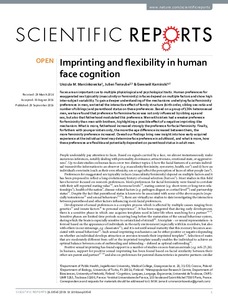Imprinting and flexibility in human face cognition
Urszula M. Marcinkowska; Gwenaël Kaminski; Julien Terraube
Imprinting and flexibility in human face cognition
Urszula M. Marcinkowska
Gwenaël Kaminski
Julien Terraube
NATURE PUBLISHING GROUP
Julkaisun pysyvä osoite on:
https://urn.fi/URN:NBN:fi-fe2021042715737
https://urn.fi/URN:NBN:fi-fe2021042715737
Tiivistelmä
Faces are an important cue to multiple physiological and psychological traits. Human preferences for exaggerated sex typicality (masculinity or femininity) in faces depend on multiple factors and show high inter-subject variability. To gain a deeper understanding of the mechanisms underlying facial femininity preferences in men, we tested the interactive effect of family structure (birth order, sibling sex-ratio and number of siblings) and parenthood status on these preferences. Based on a group of 1304 heterosexual men, we have found that preference for feminine faces was not only influenced by sibling age and sex, but also that fatherhood modulated this preference. Men with sisters had a weaker preference for femininity than men with brothers, highlighting a possible effect of a negative imprinting-like mechanism. What is more, fatherhood increased strongly the preference for facial femininity. Finally, for fathers with younger sisters only, the more the age difference increased between them, the more femininity preference increased. Overall our findings bring new insight into how early-acquired experience at the individual level may determine face preference in adulthood, and what is more, how these preferences are flexible and potentially dependent on parenthood status in adult men.
Kokoelmat
- Rinnakkaistallenteet [19207]
